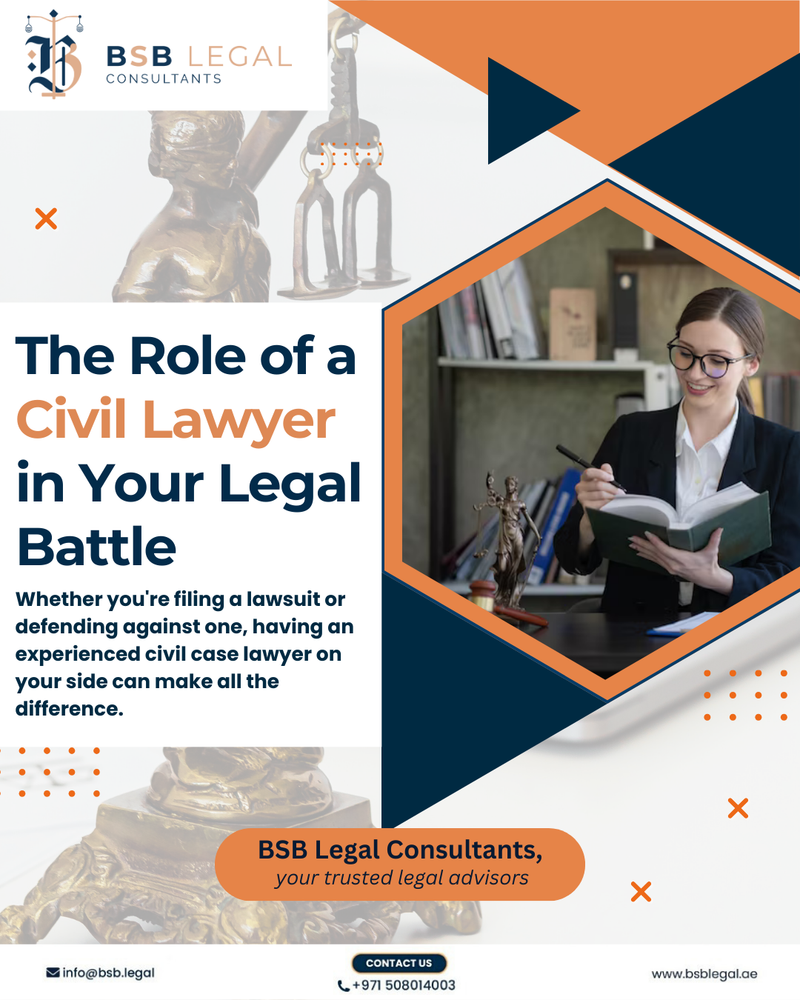The Role of a Civil Lawyer in Your Legal Battle

When you're facing a legal issue that doesn't involve criminal charges, you're likely dealing with a civil case. Whether it involves a breach of contract, a property dispute, or a family matter, the assistance of a skilled civil lawyer can make a significant difference in the outcome. In this article, we will explore the essential role of a civil lawyer, how they handle civil lawsuit cases, and why hiring a professional civil case lawyer is critical to your success.
What is a Civil Lawyer?
A civil lawyer is a legal professional who specializes in non-criminal law. Their primary focus is to resolve disputes between individuals, organizations, or both. These cases can include:
Property disputes
Contract disagreements
Family law issues
Business conflicts
Landlord-tenant disputes
Employment disputes
Unlike criminal lawyers who deal with offenses against the state, civil lawyers represent clients seeking compensation, restitution, or specific performance.
Types of Civil Lawsuit Cases
Civil cases are incredibly diverse. Here are some common types:
Contract Disputes: When one party fails to fulfill their agreement.
Property Disputes: Issues regarding real estate ownership or boundaries.
Tort Claims: Cases involving negligence or intentional harm.
Family Law Matters: Divorces, child custody, alimony, etc.
Employment Law: Unlawful termination or discrimination.
Business Litigation: Disputes between business partners or companies.
Each of these requires specific legal expertise, making the guidance of a civil case lawyer crucial.
Key Responsibilities of a Civil Lawyer
Legal Consultation: Evaluating the facts and advising on the best course of action.
Document Preparation: Drafting complaints, motions, and other court documents.
Negotiation: Attempting to resolve the matter outside of court to save time and costs.
Representation in Court: Arguing your case in front of a judge if settlement fails.
Case Strategy: Developing a legal strategy based on evidence and applicable law.
Evidence Gathering: Collecting supporting documents, witness testimonies, and expert opinions.
A civil lawyer not only interprets the law but also ensures that your case is presented in the most effective way.
The Civil Litigation Process
Understanding the litigation process can help you appreciate the role of your lawyer:
Filing a Complaint: The lawsuit begins when a complaint is filed.
Response: The opposing party files an answer or counterclaim.
Discovery: Both sides gather and exchange relevant information.
Pre-Trial Motions: Requests to resolve or narrow the issues.
Trial: If not settled, the case goes to court.
Judgment: A final decision is issued.
Appeals: If necessary, either side can appeal the verdict.
A civil case lawyer guides you through each step, ensuring procedural correctness and a strong argument.
Why Hiring a Civil Lawyer is Essential
Legal Expertise: They know the ins and outs of the legal system.
Strategic Advice: Helps you choose between settling or going to trial.
Paperwork Accuracy: Legal documents are complex and must be error-free.
Emotional Support: Legal battles can be stressful; your lawyer serves as a calming guide.
Higher Success Rate: Experienced lawyers know what it takes to win.
Without a professional, you may overlook critical details that could weaken your case.
Choosing the Right Civil Lawyer
Here are factors to consider:
Experience: Have they handled similar civil lawsuit cases?
Reputation: Check reviews or get referrals.
Communication: They should keep you informed at every step.
Specialization: Some lawyers focus on specific areas like property or family law.
Fees: Understand their billing structure—hourly, flat fee, or contingency.
Common Mistakes to Avoid in Civil Lawsuits
Not Hiring a Lawyer Early: Delays can hurt your case.
Ignoring Deadlines: Missing a filing date can lead to dismissal.
Withholding Information: Always be honest with your lawyer.
Inadequate Documentation: Keep all related documents and evidence.
Underestimating the Other Side: Assume the other party is well-prepared.
Avoiding these mistakes is easier with a dedicated civil lawyer by your side.
Conclusion
Civil legal disputes can be complicated, stressful, and emotionally draining. Whether you're filing a lawsuit or defending against one, having an experienced lawyers in Dubai on your side can make all the difference. From consultation to courtroom, they handle the legal heavy lifting so you can focus on what matters most—resolving your issue fairly and efficiently.
